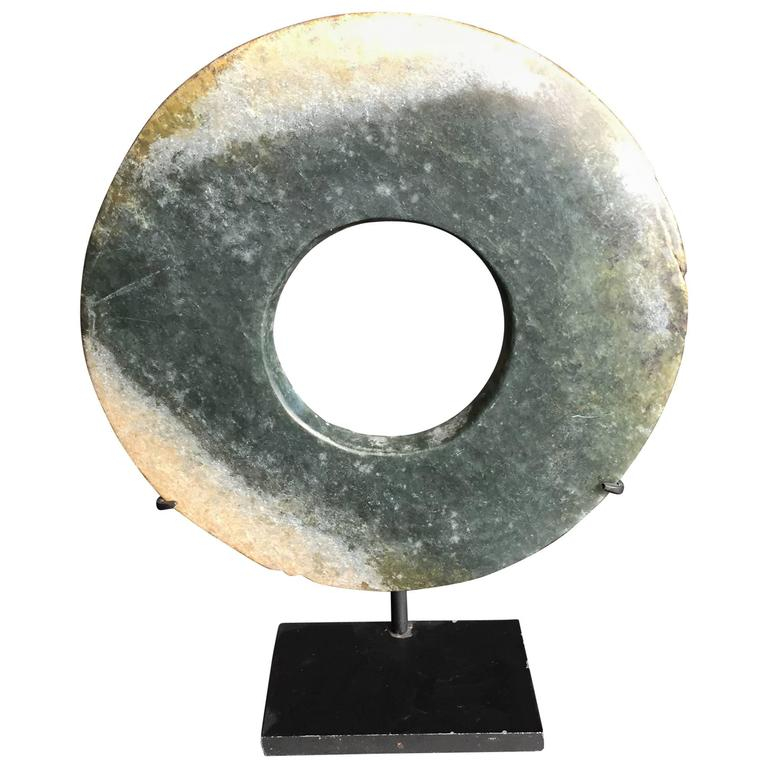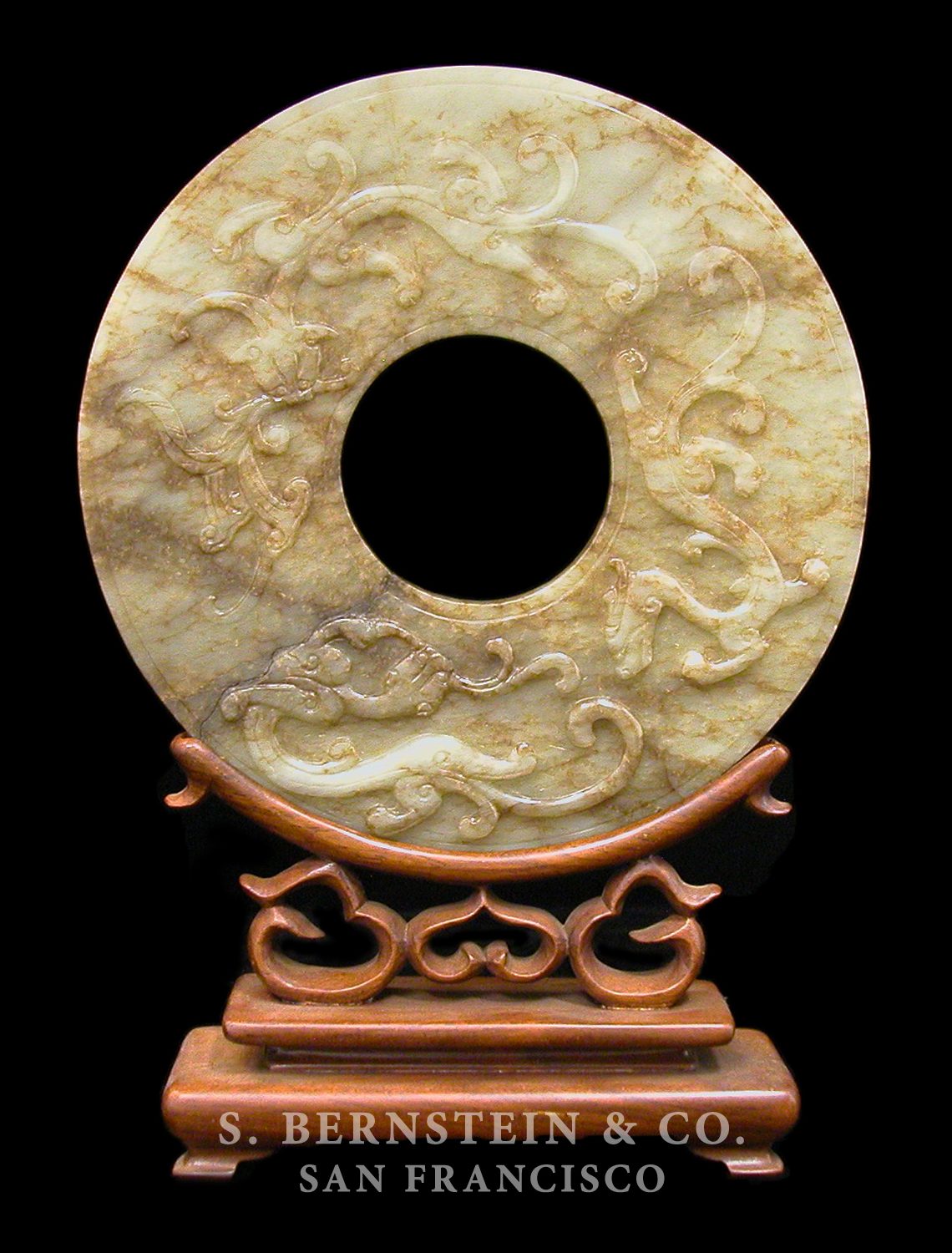
Jade Bi Disc Pair 1
The Qianlong Emperor is thought to have fathered 18 children This jade disc, known as a bi, was made in around 1200 BC but is inscribed with a text written in AD 1790. Similar discs have.

Lot A white metal mounted jade Bi disc,
Jade Bi discs became popular again during the Ming and Qing dynasties, produced as reproductions of the earlier artefacts, and have continued to play an important role in Chinese culture. The design for the medals for the 2008 Beijing Olympics took inspiration from the ancient bi, with an inset jade ring inscribed with a dragon pattern on the reverse side.

Authentic Jade Bi Disc from Ancient China 4000 Years Old Schneible
Jade 'Bi' Disk | Harvard Art Museums Photo © President and Fellows of Harvard College Gallery Text In Neolithic China, nephrite and other beautiful stones were fashioned into nonfunctional ceremonial blades and ritual implements that were buried in the graves of important people.

Clouded Jade Bi Disc Browse or Buy at PAGODA RED
The bi ( Chinese: 璧) is a type of circular ancient Chinese jade artifact. The earliest bi were produced in the Neolithic period, particularly by the Liangzhu culture ( 3400 - 2250 BCE ). [1] Later examples date mainly from the Shang, Zhou and Han dynasties. They were also made in glass . Description

Jade Bi Disc Browse or Buy at PAGODA RED
Rawson 1995: The disc is one of the major forms of ancient jade. Traditionally discs with central holes have been given a variety of names, depending on the proportion of the width of the ring to the diameter of the hole. The term 'bi' has been applied to wide discs with proportionately small central holes. If the hole is considerably larger in.

Jade Bi Disc Browse or Buy at PAGODA RED
It's a jade ring, called a 'bi'. This jade bi, already over three thousand years old when the Emperor decided to study it, is a fine, plain disc with a hole in the centre, of a type often found in ancient Chinese tombs. The Emperor took the unadorned bi, and then had his own words inscribed on it. In doing so, he transformed the ancient bi into.

Jade Bi Disc Browse or Buy at PAGODA RED
This spectacular massive jade bi and its magnificent bronze stand would have once stood outside an important hall in the Forbidden City. The only counterpart known cut from the same stone with a bronze 'dragon' stand cast in the exact same style and of the same size still stands precisely positioned in the central axis facing the Yangxindian.

Mottled Jade Bi Disc Browse or Buy at PAGODA RED
bi Object Type bi Museum number 1884,0405.1 Description Jade 'bi' (disc). Cultures/periods Liangzhu culture Production date 3300 BC-2200 BC (circa) (circa) Production place Made in: Jiangsu (province) (?) Asia: China: Jiangsu (province) Made in: Zhejiang (province) (?) Asia: China: Zhejiang (province) Findspot Found/Acquired: China Asia: China
Authentic Jade Bi Disc from Ancient China 4000 Years Old For Sale at
The Chinese Bi Disc is a kind of circular Chinese jade or stone artifact. The earliest bi were produced in the Neolithic period, particularly by the Liangzhu culture. Chinese Bi - Fish Small Chinese Bi Disks Chinese Medium Bi Disks (10-25cm) Chinese Bi Disk Large Jade Bi discs (35-60cm) Bi-shaped Jade discs Feng Shui Chic

Clouded Jade Bi Disc Browse or Buy at PAGODA RED
The Jade Bi-Disk from China, Use, Meaning and Material in Historic and Prehistoric Times. Introduction www.jadebidisk.com URL English - German General Information: The artifacts shown on this site are unsalable, they serve only for orientation to purchase similar artifacts.

Jade disc bi Ben Janssens Oriental Art
Jade 'Bi' Disk | Harvard Art Museums 1943.50.523: Gallery Text In Neolithic China, nephrite and other beautiful stones were fashioned into nonfunctional ceremonial blades and ritual implements that were buried in the graves of important people.

Jade Bi Disc with Dragons S. Bernstein & Co. Jade & Oriental Art
The bi ("disc") is an object that was originally made from jade, and became an independent motif that appeared widely in different pictorial materials during Han times. The bi disc is considered one of the earliest jade forms, and has been used for ritual purposes or as an ornament from the Neolithic period until today. This paper focuses on the Han Dynasty (202 BCE-220 CE), a period in.

Mottled Jade Bi Disc Browse or Buy at PAGODA RED
The Jade Discs, often called bi discs, are round flat rings created from nephrite by the Liangzhu culture, which thrived during the late Neolithic Period from around 3300 to 2300 BC. Archaeological findings of the Liangzhu culture reveal their mastery of silk weaving, lacquering, and mortise-and-tenon joints in timber construction.

Sold Price A JADE 'BI' DISC April 6, 0117 400 PM CST
Thousands of jade bi, too large to be worn as jewelry, have been unearthed in elite burial sites associated with the Liangzhu culture. Variations are apparent in the size of the disks, the quality of the stone used, the level of workmanship, and the finish of the bi, yet their meaning, purpose, and ritual significance remain unknown.

CHINESE JADE BI DISC
bi, in art, Chinese jade carved in the form of a flat disk with a hole in the centre. The earliest examples, which are unornamented, date from the Neolithic Period (c. 5000-2000 bc ).

Jade Bi Disc Browse or Buy at PAGODA RED
They used two distinct types of ritual jade objects: a disc, later known as a bi, and a tube, later known as a cong. The main types of cong have a square outer section around a circular inner part, and a circular hole, though jades of a bracelet shape also display some of the characteristics of cong.